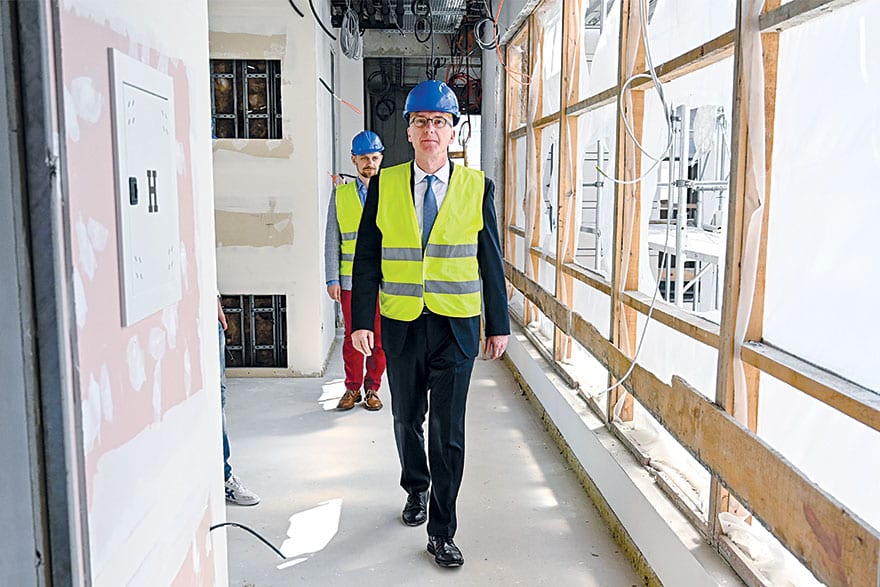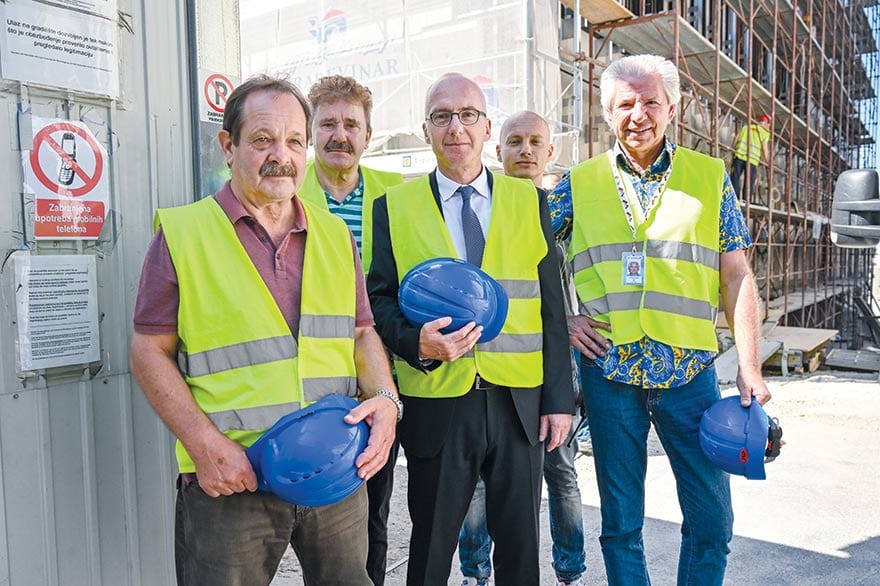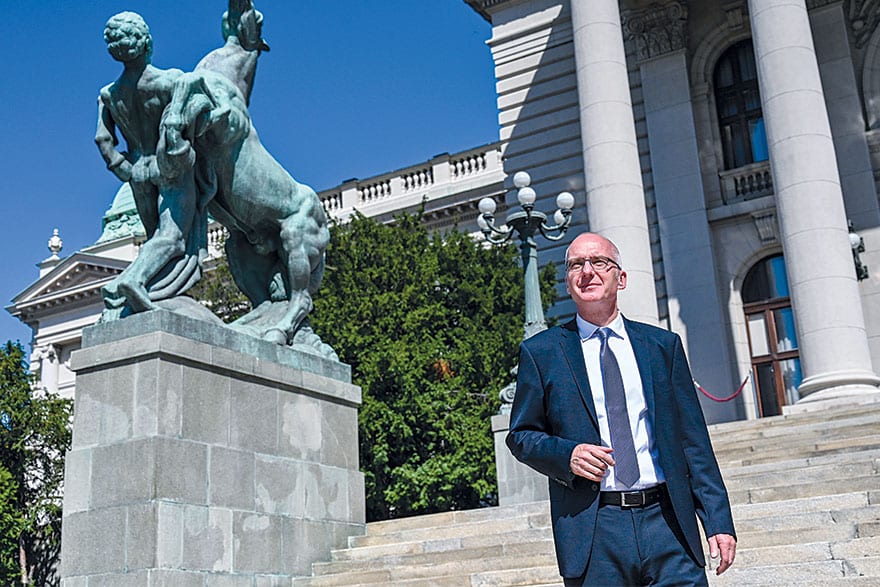All democratic elections can only benefit from the experience of OSCE observers, and their assessment can increase the legitimacy of an election process as a whole. It is common practice in all OSCE member countries to invite them, and Germany is no exception – Thomas Schieb
The German ambassador shares the view that opposition parties should also participate in the upcoming parliamentary elections, because, as he notes, “a healthy democracy needs a strong opposition in parliament, a pluralistic society where dissenting voices and alternative policy ideas can make themselves heard.” On the other hand, notes German Ambassador to Serbia Thomas Schieb, elections must be fair and free, a contribution to which could be provided by the involvement of the OSCE mission.
Commenting on the selection of former German defence minister Ursula von der Leyen as president of the European Commission, Ambassador Schieb says he’s pleased to see her also joining the ranks of European officials who insist on the importance of EU enlargement.
The door remains open, he says in this interview for CorD Magazine, adding that the pace of accession negotiations depends on Serbia’s progress with regards to these criteria, especially in the fields of the rule of law, media freedom and the fight against corruption.
Your Excellency, when taking on the post of President of the European Commission, former German defence minister Ursula von der Leyen chose the Scorpions’ song “Winds of Change” as an illustration. What kind of changes do you expect in the EU?
– I am happy that a compatriot, a very experienced, dedicated and smart German politician, has been chosen for the top position of the European Commission. Ursula von der Leyen is a true European, and I think it is excellent news that she underlined the importance of EU enlargement in one of her first statements.
How much will Serbia’s path towards EU membership change in the light of the deep internal reforms within the Union?
– We see further accession negotiations and necessary EU reforms as two parallel processes. The door to the EU stands open for Serbia. EU heads of state and government have reiterated this commitment on various occasions, including the Western Balkans Summit in Sofia last year.

The pace of accession negotiations depends on Serbia’s progress with regard to these criteria, especially in the fields of the rule of law, media freedom and the fight against corruption.
The most recent report of the European Commission renders the areas of progress very transparent, but also shortcomings. It is up to Serbia to decide how fast it wants to become a member and to take action necessary.
Serbia only opened one new EU accession negotiation chapter in June, while the Serbian government insists the country is ready for much more. Do you agree with the assessment that the opening of just one chapter is the result of dissatisfaction among the EU Member States regarding progress achieved to date on Serbia’s reform processes, especially in the area of the rule of law?
– I think there is too much focus on the number of chapters opened – in the end, it is more important to close chapters than to open them. The negotiation process is a work in progress; everyone knows what has been achieved and what remains to be done.
I encourage stakeholders in the government, parliament and civil society to continue pursuing the course of reform; in particular concerning the rule of law, which is indeed of particular importance.
We see the accession negotiations and necessary EU reforms as two parallel processes. The door to the EU stands open for Serbia
You have stated that Germany “closely monitors developments in Serbia”. How do you see attempts to establish a dialogue between the government and the opposition aimed at creating the conditions for fair elections?

– A healthy democracy needs a strong opposition in parliament, a pluralistic society where dissenting voices and alternative policy ideas can make themselves heard. And, of course, the opposition should participate in elections – which need to be free and fair, that goes without saying! That said, I welcome the dialogue between governing and opposition parties, and I do hope that they can find common ground on how to safeguard conditions for free and fair elections.
Considering that the EU has so far relied on the reports of OSCE observers when it comes to monitoring election processes, do you think it would be useful for Serbia’s upcoming elections to be monitored by an OSCE mission in its full capacity?
– All democratic elections can only benefit from the experience of OSCE observers, and their assessment can increase the legitimacy of an election process as a whole. It is common practise in all OSCE member countries to invite them, Germany being no exception. So, the answer is a definite “yes”.
How would you rate the current state of media freedom in Serbia?
– We share the assessment of the European Commission contained in the aforementioned report. There is room for improvement, and the issues are well known: transparency of media ownership, fair access to public funding and media independence, to mention but a few.
German companies expect Serbia to continue the path of reform to create a “level playing field”. The German Federal Government will continue supporting Serbia in the implementation of important reforms in that regard
Responding to the recent call of the countries of the so-called NATO Quint (Germany, the UK, Italy, France and the U.S.) for the dialogue between Belgrade and Pristina to be restored as soon as possible, Serbian President Aleksandar Vučić said that he considered it a form of pressure on Serbia to recognise the independence of this breakaway province. Is this the actual meaning of the message that was also signed by your country?
– The recent statement of the Quint is crystal clear: both sides, Belgrade and Pristina, are called upon to resume the normalisation dialogue and to abstain from any action that could poison the atmosphere and make it impossible to gather around a table.
Whatever they may agree upon in the end, it has to be mutually acceptable, comprehensive and legally binding, so that both countries can pursue their chosen path towards EU membership.
Do you think that the message of the Quint – insisting that Pristina abolishes taxes on goods coming from central Serbia, while Serbia ceases lobbying against independence – creates an illusion that both parties are equally responsible for the current crisis in the dialogue? Does such a description really correspond to reality?
– I believe that the statement takes account of the situation as it stands and points to a more promising future for the people of Serbia and Kosovo. Looking backwards and engaging in “blame games” is always tempting because it is easy, but it is not helpful. Germany wants the dialogue to resume as quickly as possible. The Quint has encouraged both sides to help make this happen.
Following the cancellation of the planned meeting between the presidents of Serbia and Kosovo with the leaders of Germany and France in Paris, you stated that this dialogue is not dead but is just “not currently happening”. When do you think it will continue?
– Berlin and Paris remain committed to the process but are equally aware of political timetables in Serbia and Kosovo. They will be very diligent regarding the timing of this meeting.
Considering the time you’ve spent as ambassador to Serbia, how would you rate the level of economic cooperation between the two countries?

– I am very pleased to see that economic cooperation continues to widen and deepen. We see more companies investing in high-tech sectors, such as the establishment of R&D divisions of German companies here.
Today we see more than 400 companies supplying some 60,000 jobs in Serbia. The German-Serbian Chamber of Commerce is very active and, with further progress being made in the accession process, this situation will most likely improve even more.
You’ve noted that German investors are satisfied with results in Serbia but lack more legal certainty in doing business. Are there any other obstacles that need to be overcome in order for German companies to continue being interested in investing in Serbia?
– Here again, we are back to the aforementioned chapter 23 – the rule of law and the report of the EU Commission. Yes, I think that more needs to be done regarding an efficient and independent judicial system, and that could unleash bigger FDI inflows, not only from Germany.
The 2018 annual survey of the German Chamber of Commerce confirmed that German companies expect Serbia to continue the path of reform to create a “level playing field”. The German Federal Government will continue supporting Serbia in the implementation of important reforms in that regard.
World Bank experts recommend that Serbia try to attract investments that create jobs for highly educated people because, at present, there are a large number of investors employing lower-skilled and cheaper labour. Do you see an opportunity for German companies with that kind of profile to come to Serbia?
– We already see that more and more German companies employ highly skilled people like engineers and IT experts. A number of companies have developed interesting models of cooperation with technical schools and universities. I am very encouraged by this and do hope that this is just the beginning.
Looking backwards and engaging in “blame games” is always tempting because it is easy, but it is not helpful. Germany wants the dialogue to resume as quickly as possible. The Quint has encouraged both sides to help make this happen
There is a concern in Serbia that the opening up of Germany to specialised foreign staff, now also facilitated by law, could further encourage Serbian citizens to leave the country. How do you view this situation?
– The law to which you are referring is the so-called ”Fachkräfteeinwanderungsgesetz”. It will enter into force as of March 2020 and is meant to attract highly qualified people from all over the world. The competent authorities in Germany are now working on regulations to govern how this law will be implemented and how the process will be organised.
The consequences for the countries of origin are indeed something that we have to keep in mind. Knowing that the decision to leave home to work abroad is an individual one, we will continue to cooperate with Serbia to create conditions that are conducive to circular migration, to the benefit of both Serbia and Germany.
What kind of results has been achieved to date when it comes to the German Government’s programmes to encourage Serbian citizens who’ve studied in Germany to return home?
– The idea behind this and other programmes is to promote the transfer of know-how that Serbian professionals have acquired during their studies, professional training or on the job. We are aware that Germany continues to attract qualified people from Serbia.
However, we also know that some of them at a certain point imagine returning home, capitalising on what they’ve learned in Germany by, for example, starting a business. That’s why we will soon start an additional programme supporting the return home from Germany of these future entrepreneurs. The success of this and other programmes will have to be evaluated in the medium to long term.
| ACTION
It is up to Serbia to decide how fast it wants to become a member and to take action necessary |
ELECTIONS
The opposition should participate in elections – which need to be free and fair, that goes without saying |
JOBS
Today we see more than 400 companies supplying some 60,000 jobs in Serbia |
|---|